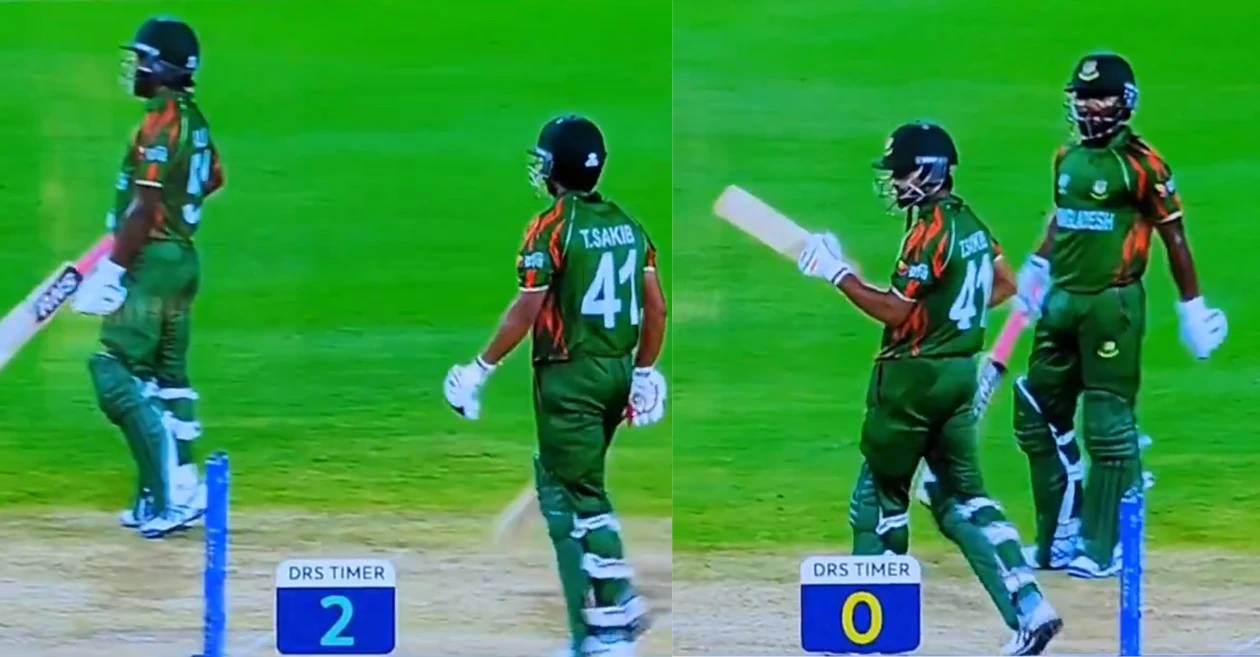During Bangladesh’s critical encounter against Nepal in the ongoing T20 World Cup 2024, Jaker Ali found himself at the center of a controversy that has sparked widespread debate in the cricketing world. In the 14th over of Bangladesh’s innings, Tanzim Hasan Sakib was adjudged LBW by the on-field umpire off Nepal spinner Sandeep Lamichhane. As Sakib began to walk back to the pavilion, Ali, his batting partner, was seen glancing towards the Bangladesh dugout. What followed was a gesture from Ali to Sakib, seemingly suggesting a review just before the DRS timer was set to expire.
The DRS Review Drama
The pivotal moment came when Sakib decided to review the on-field decision based on Ali’s suggestion. The replays indicated that the ball from Lamichhane was missing the leg stump, leading to the overturning of the umpire’s decision. However, the joy of the reprieve was short-lived as Sakib fell victim to Lamichhane’s next delivery, a deceiving googly that caught him off guard.
ICC’s Stance and Regulations
The International Cricket Council (ICC) has stringent guidelines concerning player conduct during DRS reviews. According to Article 3.2.3 of the tournament’s playing conditions, players are prohibited from seeking external assistance, including from the dressing room, during DRS deliberations. Umpires have the authority to decline a review if they suspect such external inputs have influenced the decision-making process. Moreover, Article 2.15 of the ICC’s Code of Conduct outlines penalties, including potential suspensions, for players found guilty of breaching these rules.
Public and Expert Reactions
The incident quickly went viral on social media, triggering a range of reactions from fans, pundits, and former players. While some applauded Ali’s quick thinking as a strategic move to benefit his team, others criticized it as a breach of cricketing ethics and the spirit of fair play. The controversy has revived discussions on the fine line between gamesmanship and sportsmanship in international cricket.
Debate Over Fair Play
The debate over Ali’s actions revolves around the core principles of fair play in cricket. Advocates of fair play argue that seeking external assistance, even indirectly through gestures or glances, undermines the integrity of the game. Cricket has long prided itself on the players’ responsibility to uphold the spirit of fair competition, making any deviation from these norms a contentious issue among stakeholders.
Potential Consequences
As the video footage continues to circulate and gather attention, speculation mounts over the potential consequences for Ali and Sakib. If found guilty of breaching ICC regulations, particularly those related to Level 3 offenses under the Code of Conduct, both players could face significant penalties. The incident underscores the importance of maintaining discipline and adherence to established protocols in high-stakes international tournaments.
Implications for the Tournament
The fallout from this controversy could have broader implications for the ongoing T20 World Cup 2024. As teams navigate through crucial matches, the incident serves as a reminder of the scrutiny players face both on and off the field. The ICC’s response to the controversy will be closely watched, as it will set a precedent for handling similar situations in future tournaments and reinforcing the integrity of decision-making processes.
A Lesson in Cricketing Ethics
Jaker Ali’s DRS consultation during the Bangladesh vs. Nepal match has ignited a firestorm of debate over sportsmanship and adherence to cricketing regulations. The incident highlights the complexities of modern cricket, where split-second decisions and tactical maneuvers can have profound consequences. As the cricketing community awaits the ICC’s verdict, the focus remains on upholding the spirit of fair play and maintaining the integrity of the sport amidst evolving challenges and controversies.
Please check for information on the best betting sites in India – https://selectory.org/best-betting-sites/
Related posts:
 Aaron Finch picks Virat Kohli’s batting position for the T20 World Cup 2024
Aaron Finch picks Virat Kohli’s batting position for the T20 World Cup 2024
 T20 World Cup: Cricket experts erupts over dead-ball rule after Bangladesh lose to South Africa
T20 World Cup: Cricket experts erupts over dead-ball rule after Bangladesh lose to South Africa
 Shahid Afridi blasts Pakistan for their humiliating defeat against India at T20 Word Cup 2024
Shahid Afridi blasts Pakistan for their humiliating defeat against India at T20 Word Cup 2024
 T20 World Cup 2024: Mitchell Marsh names the ‘most important player’ in the Australian team
T20 World Cup 2024: Mitchell Marsh names the ‘most important player’ in the Australian team
 Pakistan’s captain Babar Azam gives a touching present to an emotional child mascot | T20 World Cup 2024
Pakistan’s captain Babar Azam gives a touching present to an emotional child mascot | T20 World Cup 2024
 USA’s Indian-origin players express the special feeling of facing India in T20 World Cup 2024
USA’s Indian-origin players express the special feeling of facing India in T20 World Cup 2024
 Legendary Kapil Dev lambasts Indian team’s strategy regarding Jasprit Bumrah in the T20 World Cup 2024
Legendary Kapil Dev lambasts Indian team’s strategy regarding Jasprit Bumrah in the T20 World Cup 2024
 T20 World Cup 2024 : Suryakumar Yadav’s wife and Rohit Sharma display different emotions after the batter narrowly avoids dismissal in IND vs USA game
T20 World Cup 2024 : Suryakumar Yadav’s wife and Rohit Sharma display different emotions after the batter narrowly avoids dismissal in IND vs USA game
 T20 World Cup 2024: England registers a record win over Oman; keeps Super 8 stage hopes alive
T20 World Cup 2024: England registers a record win over Oman; keeps Super 8 stage hopes alive
 T20 World Cup 2024: Wazhma Ayoubi & others erupt as Afghanistan record historic win over Papua New Guinea
T20 World Cup 2024: Wazhma Ayoubi & others erupt as Afghanistan record historic win over Papua New Guinea
 T20 World Cup 2024: Rashid Khan names the ‘superstar’ in the Afghanistan team
T20 World Cup 2024: Rashid Khan names the ‘superstar’ in the Afghanistan team
 Netizens react as South Africa clinches dramatic one-run win over Nepal in T20 World Cup 2024
Netizens react as South Africa clinches dramatic one-run win over Nepal in T20 World Cup 2024
 ‘Qualified for Karachi airport’: Fans brutally roast Babar Azam’s Pakistan after their elimination from T20 World Cup 2024
‘Qualified for Karachi airport’: Fans brutally roast Babar Azam’s Pakistan after their elimination from T20 World Cup 2024
 Andy Flower names Pakistan’s next captain following early exit from T20 World Cup 2024
Andy Flower names Pakistan’s next captain following early exit from T20 World Cup 2024
 Babar Azam opens up on Pakistan’s early exit from T20 World Cup 2024
Babar Azam opens up on Pakistan’s early exit from T20 World Cup 2024
